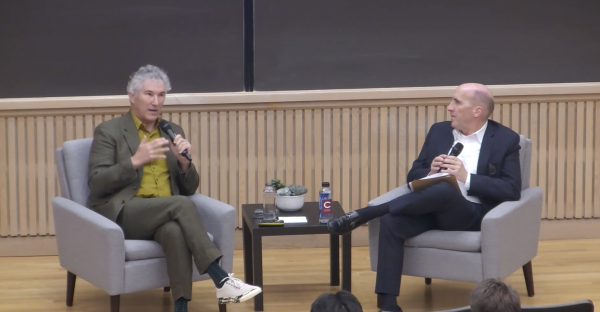Students Lobby for Healthy Teens Act
On Monday, nine representatives from Colgate attended the Family Planning Association (FPA) Conference in Albany, NY, where they met with allies in the cause of reproductive rights and sex education, made lobbying visits to the offices of state senators and heard a keynote speech by actress Kathy Najimy.
The conference was organized by Planned Parenthood, which is under the “umbrella” of the FPA. It focused on passing two pieces of New York State legislation currently in dispute: the Healthy Teens Act, which would provide state funding for “age-appropriate, medically accurate sexual education,” and a bill that would make emergency contraceptives available over the counter.
The seven students and two faculty members made the trip as part of the community service component of Assistant Professor of Sociology and Anthropology and Women’s Studies Meika Loe’s class “Women, Health and Medicine.”
With the help of Planned Parenthood’s Beth Legere, the students had collected approximately 130 signatures on a petition to show support for the Healthy Teens Act here at Colgate. According to senior Carrie Isensee, the petition helped to sway Conservative Oneida County Senator Ray Meier.
“We thought he was going to shoot us down,” Isensee said, “But he flipped through [the petition] and seemed more open.”
At the end of the visit, after voicing his concerns and receiving answers from the representatives from Colgate and from Planned Parenthood present, Meier said that he would support the Healthy Teens Act. Loe said that the meeting with Meier was indicative of the positive side of lobbying.
“It’s interesting how simple it is…if you just meet with your representative, it could be as simple as that,” Loe said.
The women also had the chance to watch the Healthy Teens Act being debated on the floor of the New York State Senate.
Senior Emily Renda was struck by the division in the Senate: toward the front, she said, were women Senators who appeared very attentive and interested, whereas the men sat in the back of the chamber and read newspapers, joked with one another and even walked around.
“Everybody basically said the same thing,” she said. “They just wanted to hear themselves talk.”
Isensee noted that it was still intriguing to see the reality of “policy in action,” as Loe said. “Something we had been working toward and really fighting for was actually being discussed,” Isensee said.
Later, the women heard from many politicians and experts in a variety of fields within the cause of reproductive rights at a luncheon with hundreds of other attendees.
During the luncheon, an assemblyman came to the microphone to inform the assembled activists that the Healthy Teens Act had passed. This is not the first time, however; Governor George Pataki still has the power of veto over this bill, and he has exercised that power in the past.
“There is definitely a chance he’s going to veto it again,” Isensee said, citing Pataki’s rumored presidential ambitions.
Women’s Studies Production Assistant Heather Angstrom ’05 was slightly more optimistic.
“They say that every year, [the Healthy Teens Act] gains momentum,” she said. “More people get behind it.”
Najimy’s address presented in a comedic context her experience of losing her virginity at the age of 18 and finding out that she was pregnant, then looking in vain for sympathy from her doctor.
“She’d flown from Los Angeles to be able to talk to a group of 900 like-minded individuals,” Loe said.
“It was heartening…how much enthusiasm there is for women’s rights,” Angstrom said. “But to me, there was a feeling that it’s an uphill battle. The political climate is against us. Roe [versus Wade] is really in danger.”
Loe agreed with the Angstrom’s view that the battle has yet to be fought.
“[The conference] looked like an election,” Loe said, pointing out that there were red, white and blue streamers and balloons everywhere. “It looked like we’re getting ready for 2008…The message, for me, was, ‘the election is already starting.'”




